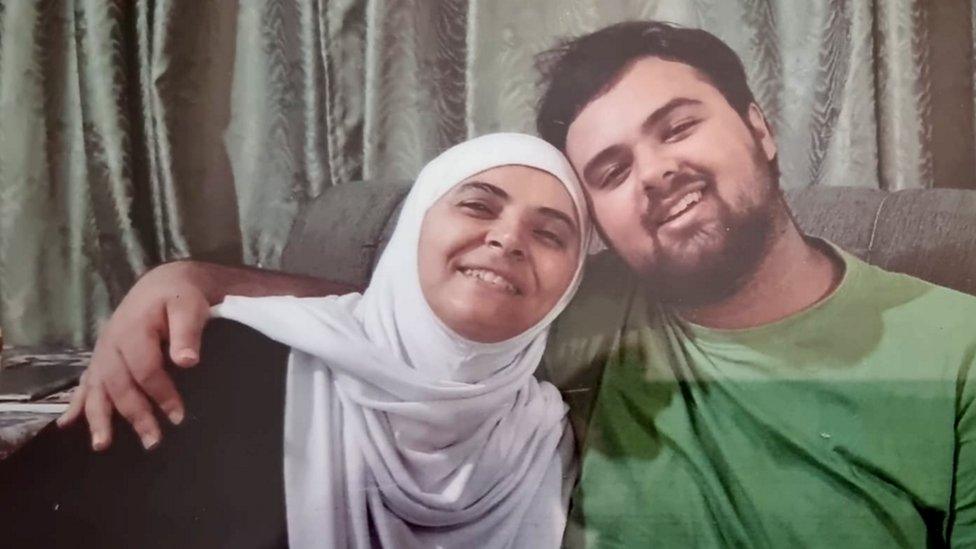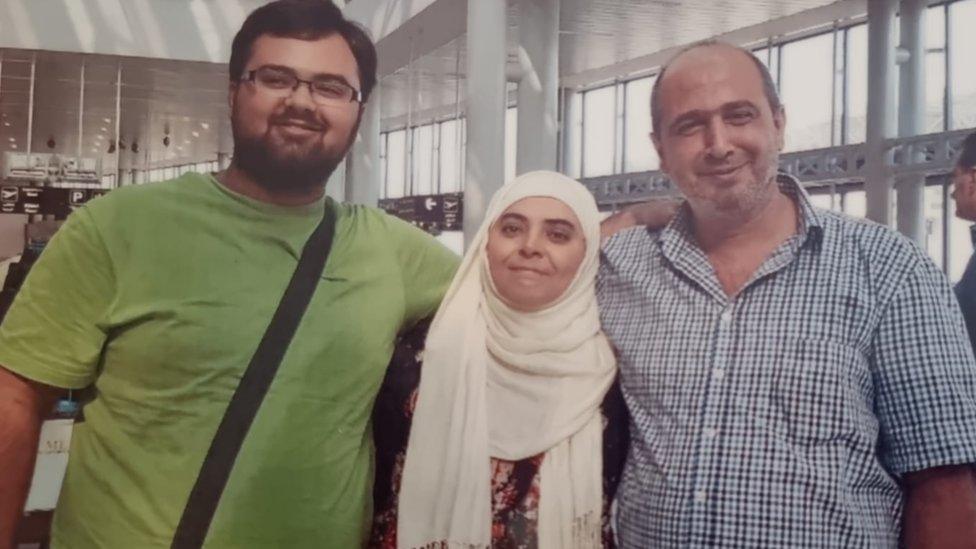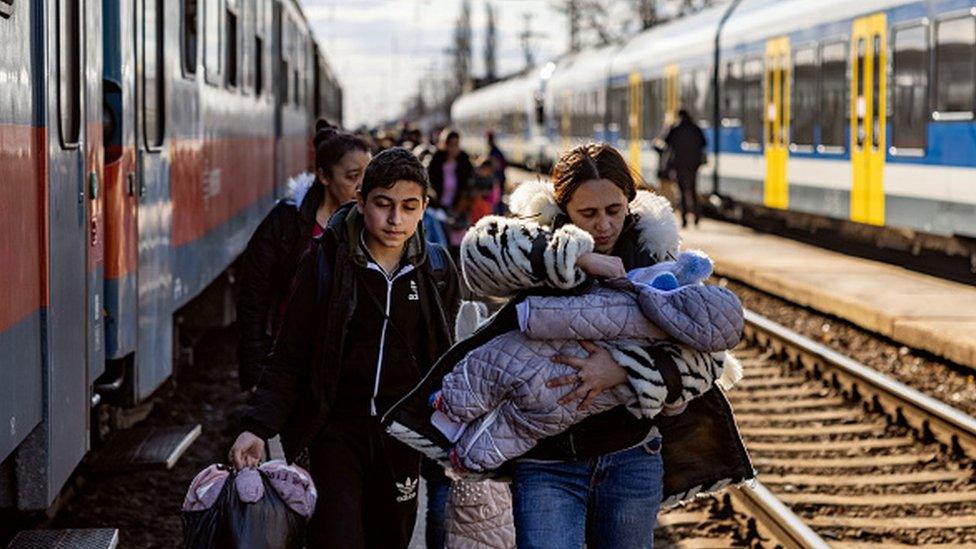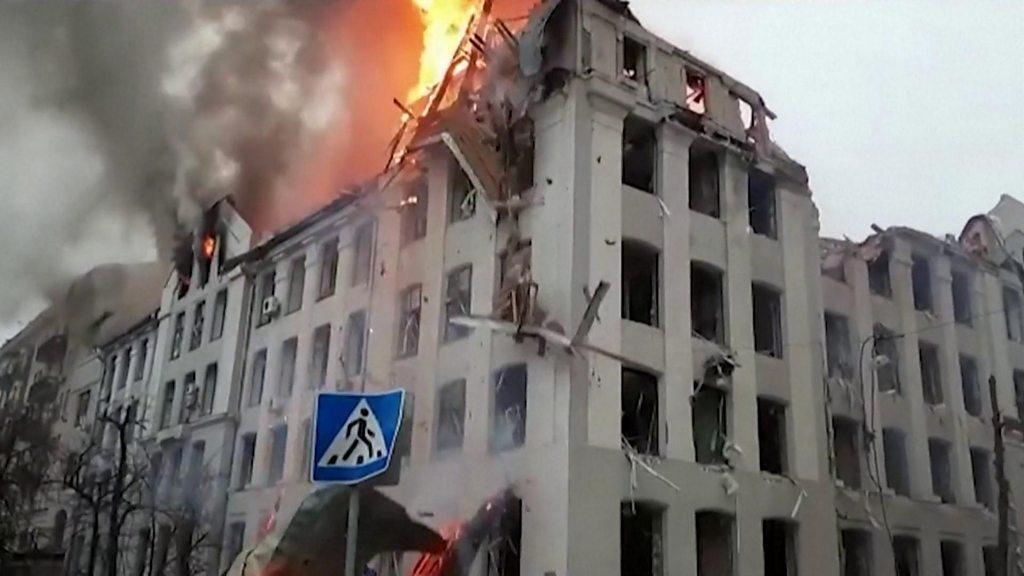Ukraine war: Syrian family desperate to bring stateless son to UK
- Published

Sarab Meslmani said she was relieved when her son called to say he was safe in Germany
A Syrian student's family has appealed to the Home Office to allow him to join them in Scotland after he fled the war in Ukraine.
Naeem Hijazi, 24, is in Germany, having escaped conflict for the third time.
After leaving behind the war in Syria with his parents in 2013, he then had to abandon his medical studies in Sudan during a military coup.
His family, who resettled in Dumfries as Syrian refugees, are now desperate to bring him home.
Naeem is one of about one million people who have left Ukraine since the Russian army invaded last week.
His mother Sarab Meslmani told BBC Radio's Good Morning Scotland that she was "relieved" he had reached Germany after a gruelling journey out of Ukraine.
"It was very difficult for him," she said. "He walked about 65km and before that he stayed on the train for about 30 hours."
During his journey on foot the temperature at night dropped to -5C.
The Polish government transported him to Germany, and having crossed the border on Tuesday night, Naeem was finally able to call his mother to tell him he was safe in a hotel on Wednesday.
'He is scared'
His uncle Asem Muslmani, who lives in Glasgow and works as an assistant pharmacist in Dumfries, said Naeem was now "stateless" and unable to leave Germany.
Naeem began reading medicine at the Red Sea University in Port Sudan five years ago but his studies came to a halt after the military coup in 2019.
He went to Ukraine on a student visa and had been given a place to resume second year studies in medicine at Karazin National University in Kharkiv shortly before the Russian invasion.
"It started in Syria, then Lebanon, then Sudan, then Ukraine. He fled Ukraine, he reached Germany," Mr Muslmani said.
"He is scared, he wants to reunite with his family again. His mother is suffering also from loneliness, from sadness.
"We are begging the Home Office to bring Naeem here, to restart his life here again."
Home Office is 'only hope'
Mr Muslmani said: "It's too long - five years - for a young kid. He's suffered a lot. I think he needs some rest at the end of his journey.
"His family, his father and mother came here to Scotland to settle here without their only son."
Naeem is not entitled to return under the new visa rules for Ukrainians, as he is not a citizen of the country.
"The only hope is that the Home Office can hear this problem, this humanitarian issue, and bring Naeem here to Dumfries, to his family, and start again," Mr Muslmani added.

Naeem Hijazi's parents Abdul Majeed Hijazi and Sarab Meslmani have not seen him for five years
Naeem and his parents, Mrs Meslmani and her husband Abdul Majeed Hijazi, left their home in Homs, Syria for Lebanon in 2013.
They were offered resettlement through a UN scheme in 2017, but by then Naeem, who had just turned 18, was studying in Sudan where tuition costs were much less expensive.
Naeem was refused re-entry to Lebanon in time to join his parents in the resettlement scheme, and an assurance that he would be processed separately came to nothing.
Since their arrival in the UK in September 2018 his parents have been trying to secure his return through a family reunion visa. They had already begun an appeal against the rejection of his first application when Russia invaded Ukraine.
'Suffered through three wars'
Naeem had not been in Ukraine long before he caught Covid-19 and did not know anyone who could support him through his illness, his uncle told the BBC.
"He did not have a lot of time to recover from it before the invasion happened," Mr Muslmani said.
"Naeem has suffered through three wars now in three different countries, I think the least thing he deserves is to finally feel safe and settled with his family at home in Dumfries.
"His parents only have him and he only has them. The whole family is struggling."
Damian Hinds, the UK government security minister, told Good Morning Scotland it was difficult to comment on an individual case, but he added: "I do know that we are going to be trying to do what we can, all we can, to recognise everybody's different individual circumstance."
He said the UK's community sponsorship programme for people escaping the Syrian conflict was part of the "template" they wanted to replicate for Ukraine.
"We want to do it now on a much, much bigger scale," Mr Hinds said.
- Published4 July 2022

- Published2 March 2022
